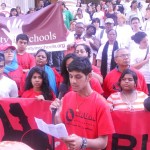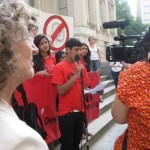YouthPower! Joins Dignity in School Coalition to Testify and Hold Press Conference at Dept. of…
Media Coverage
Daily News, “Increase Counseling to Drop Suspensions”
Queens Chronicle, “Protesting School Suspension Rates”
Edvox, “Students Know Best on High Suspension Rates
and Zero Tolerance in NYC Schools”
NESRI, “Dignity in Schools NY Takes Action”
FOR IMMEDIATE RELEASE
June 22, 2011
Contact: Roksana Mun, Desis Rising Up and Moving, 646-509-0922, roksana.mun@gmail.com
Maria Fernandez, Sistas and Brothas United, 646-623-9905, maria@northwestbronx.org
Shoshi Chowdhury, Dignity in Schools Campaign-New York, 347-832-8391, shoshi@nesri.org
Communities and Elected Officials Took Action, Calling on NYC Department of Education to Reduce Suspensions and Implement Positive Alternatives
Members of Dignity in Schools Campaign-New York Took Action
and Testified at School Discipline Code Hearing
New York, NY – On June 21, over 100 students, parents, educators, advocates and elected officials strongly spoke out against rising suspensions and demanded positive alternatives at a press conference hosted by the Dignity in Schools Campaign-New York (DSC-NY), and testified at the public hearing on proposed revisions to the NYC Department of Education’s Discipline Code. The students, parents, and advocates, representing over twenty-five organizations collectively, wore t-shirts that highlighted statistics on school pushout and positive alternatives.
Esperanza Vasquez, a public school parent and member of the New Settlement Apartments Parent Action Committee, spoke about how the public schools in her area of the south Bronx have permanent metal detectors and continually have the highest rates of suspensions and arrests of students. “Our students cannot learn if they do not feel safe. We need a school culture that is not just positive, but also diverse—one that actually makes conflict go away and prevents violence altogether. We want dignity for our students; we want respect for our people.” She demanded a more effective disciplinary system and better training for School Safety Agents.
Over the past decade, suspensions across NYC have increased at an alarming rate. In 2008-2009, there were nearly 74,000 suspensions in NYC public schools, up from 28,500 in 2001-2002. These punitive policies target students of color at higher rates, contributing to the achievement gap and low graduation rates. Black students, who make up 33% of the population, received 53% of suspensions.
City Council Member Jumaane Williams said that he is tired of coming to the steps of Tweed Courthouse to discuss these issues that affect Black and Latino youth more negatively than others. “I think if it was the reverse we’d have this problem fixed already,” he said. As one who grew up with a disability and attended public schools, he is familiar with what it’s like to be targeted by school administrators. “The education system should be fair. Just because you are disabled, just because you are Black, just because you are Latino, you should not be suspended at a higher rate.” He urged all to continue speaking out against these injustices.
Nilesh Vishwasrao, a 17 year-old, who was pushed out of Flushing High School said, “We as the youth are here to say that suspensions are not the answer to all problems. On the contrary, we need to implement positive alternatives, such as restorative justice, peer mediation and more one on one counseling. Also, we would like the DOE to meet with students, parents, and the Dignity in Schools Campaign regularly because, at the end of the day, WE are the experts on how to deal with the youth, not the SSAs or misinformed staff who continue to tell their students that they are just not good enough.” As a member of Desis Rising Up and Moving (DRUM) and the DSC-NY. Nilesh is organizing other youth to change the policies and practices that denied him his right to education.
In the last two years, as a result of advocacy from members of DSC-NY, the Department of Education has made some positive changes to the Discipline Code. However, schools are still given wide discretion to enact severe suspensions as they see fit for a wide range of often minor misbehaviors, resulting in high suspension rates and detrimental outcomes for students.
Various speakers stated that the Department of Education must not simply allude to restorative alternatives as options in the Disciplinary Code, but they must provide guidelines and encouragement so that schools have the tools to implement them. Linda Morales, a student at Belmont Preparatory High School and a youth leader of Sistas and Brothas United, spoke of her frustrations. After being trained as a peer mediator, she has had very little opportunity to use her skills. “Students do not want to be in an environment where they feel like they are doing something wrong all the time. Every day we have to go through metal detectors and we are watched by cameras everywhere we go, which makes us feel like criminals.” Many students, like Linda, want to help implement positive changes, but they need more support from administrators and the DOE.
The DOE hearing happens once a year to get public input before the new Discipline Code is released in September, and these are the types of changes and guidelines that many would like to see. In addition to demanding that a tiered system be implemented that reserves suspension only for the most serious infractions, DSC-NY is calling for the Office of School and Youth Development to hold monthly meetings with communities throughout the year to gather input and monitor implementation of the Code.
Schools around the nation that have implemented positive alternatives to suspensions, like restorative justice practices, conflict resolution, and PBIS, have seen reductions of up to 50% in suspensions and violent incidents, and increases in teacher satisfaction and academic outcomes. Schools in New York City are also beginning to implement these positive approaches. Brady Smith, the principal of Validus Preparatory High School, spoke about the restorative justice practices at his school, which he believes are positive alternatives to the harsh consequences that can harm a young person’s self esteem and academic achievement. “As New York City public schools, our mission is to teach. At Validus Prep we have excellent teachers and a dynamic curriculum, but we also strive to teach our students what to do when we make a mistake and how to hold each other accountable in order to be the best possible citizens in a democratic society.” Mr. Smith’s experience demonstrates that restorative practices do have an important place in the curriculum.
“This year the Department of Education spent $300 million on school safety, managed by the New York Police Department. Our schools have twice as many law enforcement officers as they do counselors,” said the Reverend Dr. Emma Jordan-Simpson, Executive Director of the Children’s Defense Fund New York. “The DOE must invest in our schools, but they have to do it differently. They must incorporate the knowledge and the experience of parents, students, teachers, and administrators. We must work together—we want to work together—and that is why you see us here today.”
The majority of those gathered on the steps for the press conference entered the building for the hearing, filling the room to capacity and leaving dozens of participants to show their support from outside. Over twenty-five students, parents, and advocates testified on behalf of DSC-NY and other organizations, sharing personal stories that highlight the problems with the current Discipline Code and commending the positive changes that have been made so far. Many of the speakers echoed a similar message: we need to put an end to these ineffective punitive practices and work together to implement restorative justice alternatives that have already been successful in several school districts.
The Dignity in Schools Campaign-New York (DSC-NY) is a citywide coalition of students, parents, advocates, educators and lawyers calling for positive, school-wide approaches to discipline that improve school climate, reduce conflict, and increase learning. We work to reduce suspensions and other harsh policies that violate students’ human rights to education and dignity.
Members include: Advocates for Children, Children’s Defense Fund-NY, Desis Rising Up and Moving (DRUM), Future of Tomorrow, Girls for Gender Equity, Make the Road New York, Mass Transit Street Theater, National Economic and Social Rights Initiative (NESRI), New Settlement Apartments Parent Action Committee, New York Civil Liberties Union (NYCLU), Sistas and Brothas United, Teachers Unite, Urban Youth Collaborative, Youth Ministries for Peace and Justice, and Youth on the Move.
###






